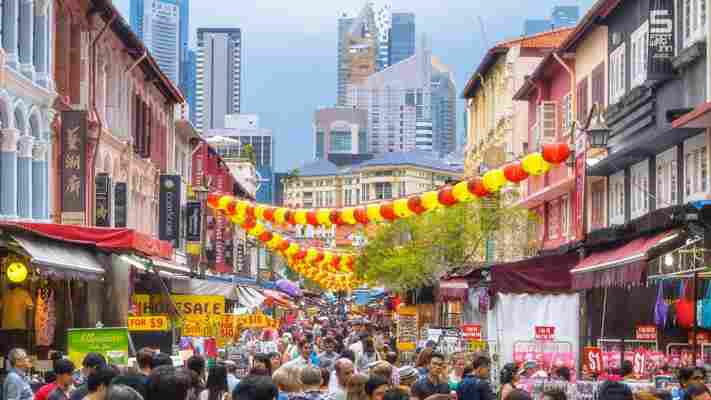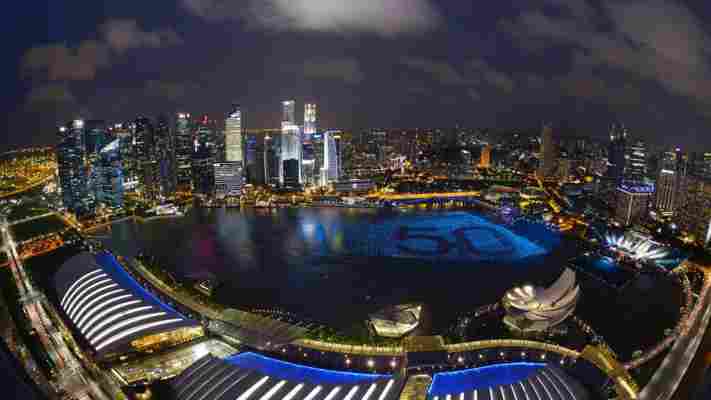Though Singapore celebrated its 50th year of independence in 2015 , the country has wasted no time organising its next tribute. The Singapore Bicentennial , which is being recognised at events, exhibits and festivals throughout 2019, commemorates the 200th anniversary of the arrival of Sir Stamford Raffles, who established Singapore as a trading post for the British East India Company.

Singapore is a country with an identity of its own
Unlike the celebrations surrounding the SG50 , however, the Bicentennial is being marked as a time of commemoration. British colonisation of the island nation has long been a contentious issue, and many locals are unhappy that the date is being marked at all. However, the Bicentennial Office says it’s aiming to provide citizens with an opportunity to reflect on a colonial past that stretches even further back – 700 years in total – and on the values that have shaped the modern-day nation.
Those values – openness, multiculturalism and self-determination, as named by the Bicentennial Office – are exactly what many residents love about living here. “Singapore is a country with an identity of its own. Diversity in ethnicity and religion meld seamlessly in social interaction and in the food and landmarks,” said Singaporean LG Han, who is chef-owner at Michelin-starred Labyrinth . “In spite of this diversity, Singaporeans all share a commonality and trait in the way we speak, the values we share and acceptance of people from all walks of life.”

Singapore celebrated its 50th year of independence in 2015 (Credit: Xinhua/Alamy)
You may also be interested in: • The city that comes alive after dark • A 3,000-year-old city that runs on AI • Five pricey cities you can now afford
Despite Singapore’s cultural diversity, the country remains in an evolving conversation around sexuality. Singapore still recognises a rule inherited from British colonial rule banning gay sex, though it has frequently been challenged in court – with new trial proceedings to begin in 2019 after India abolished a similar colonial rule, according to The New York Times . Same-sex relationships are not legally recognised in Singapore, nor can a same-sex couple legally adopt a child, but activists continue to bring awareness and change during events like the annual Pink Dot rally , named after the mixing of the red and white colours of the Singapore flag and the push toward inclusivity for all.
Why do people love it?
The mix of cultures here allows newcomers, especially Westerners, to adjust quickly. “It's a great gateway to Asia, both physically, as a fantastic hub for other travel spots in the region like Bali and Boracay, but also culturally,” said American Alexandra Feig, who has lived in Singapore for three years and writes the travel blog A Maiden Voyager . “Singapore has deep ties to the West, with a lot of British influence in particular. Walking around the town you will see Buddhist temples next to more British-style shophouses, and in local hawker centres you'll have stalls serving [Hainanese] chicken rice next to nasi goreng [Indonesian-style fried rice] and Western cuisine like hamburgers.”
Don’t make the mistake of confusing hawker-centre fare for just any street food, though, warns Canadian Jordan Bishop, who lives part time in Singapore and is the editor of How I Travel . “Two of Singapore's food stalls now have Michelin stars,” he said. Those stalls, Liao Fan Hong Kong Soya Sauce Chicken Rice and Noodle and Hill Street Tai Hwa Pork Noodle , were the first of their kind to be recognised with the honour in 2016.

The mix of cultures in Singapore allows newcomers to adjust quickly (Credit: Art Kowalsky/Alamy)
With new restaurants and bars opening weekly, Singapore has no shortage of diverse cuisine reflecting its trading port past, including Chinese, Malay, Indian, Peranakan, German, Italian, Japanese, Vietnamese, French and American.
The multiculturalism doesn’t stop at the food. Locals even have their own lingo that reflects this melting pot. Though not recognised by the government (which recently even actively discouraged its use), Singlish – a creole mix of English, Mandarin, Hokkien, Cantonese, Malay and Tamil – is commonly used in social situations like ordering coffee or gossiping with friends.
What’s it like living there?
Unlike in many other big cities, residents rarely worry about theft or violence. With one of the lowest crime rates in the world, even petty street crime is viewed as “a waste of time” said 11-year resident Bino Chua, who blogs at I Wander . “You can leave your car unlocked, your purse unattended,” said American Alison Ozawa Sanders, who has lived here for five years and is the co-author of The Expats’ Guide to Singapore . “As a woman, I can go out at night in any neighbourhood and not worry about my personal safety ever. As a parent, I don't have the feeling that if I take my eyes off my kids for two seconds they're going to be kidnapped.”
Singapore is also very clean and convenient to get around, with very few traffic jams, in part due to government restrictions on cars and the high price of vehicles here. “Some people say it’s sterile and boring, but personally I think that’s just a product of the safety and convenience here,” said Chua. “I’d take this over having to worry everyday about the possibility of getting mugged.”
Singapore has no shortage of diverse cuisine reflecting its trading port past (Credit: Jason Knott/Alamy)
The city centre has a career-focused vibe and people move at a fast pace, but it’s easy to escape the hustle when needed. “From my apartment, I could walk for about 25 minutes and find myself in dense jungle forests, and it's an extremely rewarding destination for birdwatching,” said American Daniel Burnham, Asia flight search expert at Scott’s Cheap Flights . “Singapore has beautiful national parks and a significant amount of wildlife, given its size and density.”
Since the island is relatively small, residents also recommend taking advantage of world-renowned Changi Airport and low airfares. “Whenever I started to feel restless it was easy to hop on a plane and get out of town,” Burnham said.
What else do I need to know?
Located just one degree north of the equator, Singapore has a year-round hot climate that takes adjusting to, say expats. “One has to get used to sweating all the time. And your hair will never look the same as it did ‘back home’,” said Ozawa Sanders. Frigid air conditioning inside buildings is also a ‘necessary evil’, Burnham added.
The cost of living in Singapore isn't necessarily in the stratosphere if you live a local lifestyle
Singapore is also notoriously the world’s most expensive place to live according a recent report by the Economist Intelligence Unit , with sky-high rents of around S$1,885 for a studio apartment, even away from the city centre, according to cost comparison site Expatistan.com , and new car prices running typically north of S$100,000.
Still, seasoned residents say that those numbers don’t always reflect reality. “Many visitors and expats tend to conflate life in Singapore with what you see in movies like Crazy Rich Asians or wealthy expats on relocation packages,” Burnham said. “The cost of living in Singapore isn't necessarily in the stratosphere if you live a local lifestyle. We made common-sense budgeting choices, like subletting a [public housing] HDB flat, cooking for ourselves and taking public transit. Our expenses were far less than they would have been living in the United States.” The country also has one of the lowest tax rates in the world, capping out at 22%.
Singapore’s city centre has a career-focused vibe and people move at a fast pace, but it’s easy to escape the hustle when needed (Credit: Agencja Fotograficzna Caro/Alamy)
All in all, Singapore shines best when residents make the extra effort to venture outside the sometimes-homogenous urban centre, where malls and identical apartments can seem to stretch on for miles in the larger residential neighbourhoods and commercial streets.
“There's a lot of urban diversity if you go looking for it,” Burnham said. “Hidden amid pockets of 21st-Century development, the outskirts of Singapore reveal acres of farmland, crumbling cemeteries, fishing villages and colonial outposts.”
Join more than three million BBC Travel fans by liking us on Facebook , or follow us on Twitter and Instagram .
If you liked this story, sign up for the weekly bbc.com features newsletter called "If You Only Read 6 Things This Week". A handpicked selection of stories from BBC Future, Culture, Capital and Travel, delivered to your inbox every Friday.
